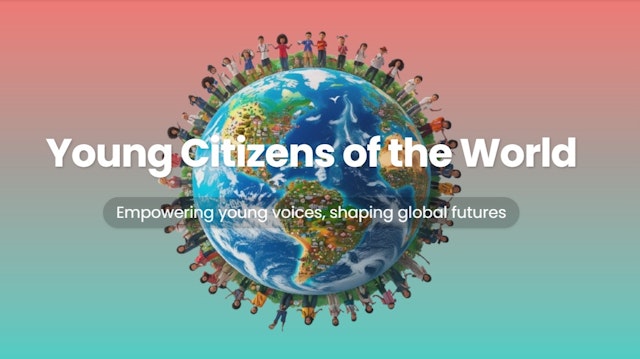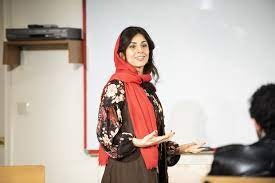Marjan was absolutely charming and we were blessed to have a teacher from Kyiv, Ukraine participating on the call.
In “English,” a hit this past winter at Atlantic Theater Company, Neshat played an Iranian teacher losing her hold on English, her second language. The Washington Post critic Peter Marks wrote that Neshat “embodies all the touching ambivalence of a person who has lived on both sides of the world and no longer resides happily in either.”
Now comes “Wish You Were Here,” which opened this month at Playwrights Horizons. Stretching from 1978 to 1991, it follows a boisterous group of female friends that gradually shrinks through revolution, war and emigration. Neshat plays an aspiring engineer whose life becomes ever more circumscribed.

“I think she’s a very Chekhovian actor,” Toossi said. “She’s so interested in the tiny ways we can destroy each other.”
Neshat, who said she was 8 when she left her beloved friends in Tehran to move to the United States, is hardly new on the New York theater scene. One of her most cherished Off Broadway credits is a 2008 production of “The Seagull” with Dianne Wiest and Alan Cumming. But much of her work has been onscreen, in supporting roles in films like the 2014 “RoboCop” remake and TV shows including “New Amsterdam” and “Quantico.”
Neshat — whom Toossi called “the best actor I’ve ever worked with” and “a gift to the new-play world” — said she has spent much of the past two decades being told that she was “not quite dark enough” or “not light enough” to be cast in the substantial roles she sought.
Then three plays set in Iran or Afghanistan, written by playwrights of Middle Eastern descent, offered her real scope
On an April afternoon, Neshat, who lives in Prospect Heights, Brooklyn, with her husband, Sam Neave, a filmmaker and editor, and 9-year-old son, Wilder, sat down at Playwrights Horizons to talk. These are edited excerpts from that conversation.
You’ve been making me cry, in “English” and in “Wish You Were Here.”
It’s funny with this play, because it’s such a slow accumulation of loss. Something about this play feels like it’s the bloodline of my family or something. It accesses something that I can’t quite put my finger on.
Tell me about your early childhood.
I was born in Iran in ’76. We moved to London in ’77, and then we moved to California. My dad never spoke English very well. My mom is a psychiatric nurse, and she’d gone to school in England. As the revolution was starting to happen — both my parents were atheist; they were socially very left — they’re like, “Well, we’ll go back.” It seemed at the beginning of the revolution that it was going to be one thing. But when we went back, they closed down the airports and it was something entirely different. [Ayatollah Ruhollah] Khomeini and religious fundamentalists had taken over. And so we got stuck. We stayed until ’84. I finished third grade there.

What do you remember?
I remember moments and I remember houses and I remember going to school. Because my parents weren’t religious, I constantly had this thing of like, I’m going to get kicked out of school, and school was really the only social life.
Do you remember any feeling in the air?
Before we left, there were a few incidents. My sister came home once and she was white as a ghost. They had whipped two people to death in front of her middle school. That was in the air. And she was taking me and a friend of mine to a swim class, which was around the corner from our house in Tehran, and this van pulled up. They’re like, “Button your top button, and your head scarf isn’t pulled low enough.” You’d heard all these stories of, like, girls get picked up and they get taken to prison. I just started screaming, and I think they let her go because I was so young. I was 7.
When you moved to this country, where did you live?
Mercer Island, which is a very small suburb of Seattle. The first day of fourth grade, I’m standing in front of the class and the only thing I basically know how to say is, “I don’t know English.” They got me a special ESL teacher, and within five months I was fluent. Just, it was so lonely.
The first play I ever did was the first experience I had of being part of something, of not feeling outside of something. And I was just like: I can’t do anything else. I did this play called “Play On!” I was 14. I had my first kiss onstage. I was this shy, introverted, bookish girl. And I got cast as this air-headed floozy.
How different has this theater season been for you than any other?
This year has been the artistic highlight of my life. I have felt supremely trusted by the writers and directors, and respected. My value in the room has been palpable to me. Sanaz and I — I feel like I’ve found my artistic mate.
People constantly talk about how representation matters, and that is true, but it doesn’t mean the same thing to everyone. I feel like for a long time we were tokenized and put in this corner of like, “These brown plays are tasked with giving a history lesson. I’m going to teach you something about where I’m from.”
What I got to do in “English,” it was so elegant, and I felt like I so understood this not belonging, or the complication of feeling closer to something that you’re not necessarily born into. All of that complexity. But it also had my knowledge of a country I come from, and this is why I feel so, so grateful for people like Sanaz, where you’re bridging this gap in a way that’s not distancing and not tokenizing. Everything as an artist that I’m interested in is human behavior.

“English” and your other plays this season are extremely humanizing of a population that’s been demonized in this country. And you’re telling stories about women in those cultures, domestic life.
Yeah, you know, it’s tiring to have it be so exotified, all of these cultures, being like, “What’s behind the veil?”
It’s not just the behind the veil thing. It’s the realm of women.
It’s true. The thing that I so have appreciated with all of these plays is the idea of the loss of potential that has nothing to do with who you are or what you can do. We’re just trying to move our life forward, and everyone just wants freedom. Possibility gets taken away through no fault of your own.
Doesn’t it bug you that you weren’t allowed to fully use your acting muscles for so long?
I can’t tell you the well of tears I cried. And all the times that I came close to quitting. It means a lot to me to have not just done these three plays, but to have been asked to bring the best of what I — all of the stuff that I’ve been like waiting, waiting, waiting. Good work makes me really feel like I am myself.
Your character and her friends in “Wish You Were Here,” that’s your mom’s generation?
Yeah. Everyone of my mom’s generation or maybe even like 10 years before who comes to see it, they’ve come up to us and been like, “We’ve never seen ourselves onstage. We’ve never seen ourselves in a piece of art.” They bring their daughters.
That’s what I mean. I don’t mean the glimpse behind the veil. I mean telling a story about these women at home, with one another, with their shoes off, just hanging out.
And their jokes, and their periods. It is very deeply moving for the Iranians because they’re like, “We’ve never seen our story, especially represented in this way of fun and light and life and just, like, the way we were.” But also, there have been so many people who aren’t Iranian. Some guy came, he was like, “I got a lot of toxic masculinity, and I cried at the end of this one.” They’re both wins, you know?
Are you feeling encouraged about the state of the theater?
I feel encouraged by the new voices and that they’re being programmed. How all of that will play out, I think it’s complicated. And there are so many things that are trying to be addressed at once. But in terms of my experience, the trust that the theaters have given to these playwrights to let them do their work — like when we did “English,” they just really let her do the play she wanted to do. We were sold out every night.
I do think that this is a kind of miraculous season in New York. And I think that the reception of that can’t help but then sort of trickle out. But I feel I have to see what next season is like, and the season after.
What do you want to do next?
So many things! Most importantly, continue to get to work on roles that have size and teeth. I feel quite hopeful, because it’s not from a place of like, “No one knows what I can do.” And therefore I do feel I’m entering the conversation more on my terms than I ever have before.

